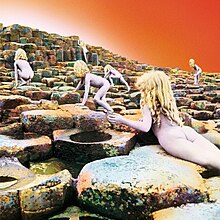Houses of the Holy
| Houses of the Holy | ||||
|---|---|---|---|---|
 |
||||
| Studio album by Led Zeppelin | ||||
| Released | 28 March 1973 | |||
| Recorded | December 1971 – August 1972 | |||
| Studio |
|
|||
| Genre | ||||
| Length | 40:57 | |||
| Label | Atlantic | |||
| Producer | Jimmy Page | |||
| Led Zeppelin chronology | ||||
|
||||
| Singles from Houses of the Holy | ||||
|
||||
| Professional ratings | |
|---|---|
| Aggregate scores | |
| Source | Rating |
| Metacritic | 98/100 |
| Review scores | |
| Source | Rating |
| AllMusic | |
| Robert Christgau | A– |
| Classic Rock | 9/10 |
| The Daily Telegraph | |
| Entertainment Weekly | A |
| Mojo | |
| MusicHound | 4/5 |
| Pitchfork Media | 9.3/10 |
| Rolling Stone (1973) | (unfavourable) |
| Rolling Stone (2003) | |
| Virgin Encyclopedia of Popular Music | |
Houses of the Holy is the fifth studio album by the English rock band Led Zeppelin, released on 28 March 1973 by Atlantic Records. It is their first album composed of entirely original material and it represents a turning point in musical direction for the band, who had begun to record songs with more layering and production techniques.
Containing some of the band's most famous songs, including "The Song Remains the Same", "The Rain Song", and "No Quarter", Houses of the Holy became a commercial success, and was later certified 11x platinum by the Recording Industry Association of America (RIAA) in 1999. In 2012, the album was ranked at #148 on Rolling Stone magazine's list of the 500 greatest albums of all time. The title track was originally recorded for the album, but was delayed until the release of band's next album Physical Graffiti in 1975.
Much of the album was recorded in Spring 1972 using the Rolling Stones Mobile Studio at Stargroves, a manor house and country estate in Hampshire county, England.Some songs from the album had initially been tried out earlier than this, such as "No Quarter", which was first attempted during a session at Headley Grange Estate, in East Hampshire.
Several of the songs were produced as trial recordings (demos) at the personal studios of guitarist Jimmy Page and bass player/keyboardist John Paul Jones. Having recently installed these studios in their homes, it enabled them to finish the arrangements which had been laid down earlier. In particular, Page was able to present complete arrangements of "The Rain Song" and "Over the Hills and Far Away", while Jones had developed "No Quarter".
...
Wikipedia
